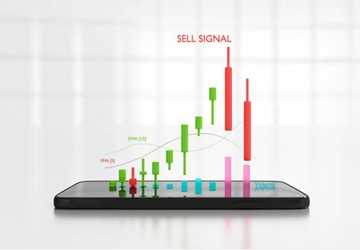The Evolution of Online Trading Platforms and Its Impact on Stocks
The advent of technology has significantly transmogrified various sectors, and the financial industry is no exception. The evolution of online stock trading has revolutionized how individuals and institutions engage with the stock market. This disquisition delves into the evolution of online trading platforms and their profound impact on stocks, offering insights into how these platforms have reconfigured the financial landscape.
The advent of technology has significantly transmogrified various sectors, and the financial industry is no exception. The evolution of online stock trading has revolutionized how individuals and institutions engage with the stock market. This disquisition delves into the evolution of online trading platforms and their profound impact on stocks, offering insights into how these platforms have reconfigured the financial landscape.
Early Days of Online Trading

The evolution of online stock trading commenced in the late 1990s when the Internet began accruing widespread popularity. Traditional stock trading was monopolized by brokers who manually executed trades. However, the advent of online trading platforms provided an alternative that was swifter, more accessible, and cost-effective.
1. Accessibility: Online trading platforms democratise stock trading by making it accessible to a broader audience. Previously, only wealthy individuals or institutions could afford to invest in stocks due to exorbitant brokerage fees.
2. Cost Reduction: The diminution in transaction costs was a significant factor in the evolution of online stock trading. Lower fees attracted more retail investors, augmenting market participation.
3. Speed and Efficiency: The transition from manual to electronic trading enhanced the velocity and efficacy of transactions. Trades that once took hours or even days could now be consummated within seconds.
The Rise of Advanced Features
As the evolution of online stock trading progressed, online trading platforms began incorporating advanced features to allure more users and provide a seamless trading experience.
Real-Time Data and Analysis
One of the most consequential developments in the evolution of online trading platforms was the introduction of real-time data and analytical tools. These features empowered traders with the following:
- Market Insights: Real-time data enabled traders to make informed decisions predicated on current market conditions.
- Technical Analysis Tools: Platforms began offering charting tools, indicators, and other resources to help traders analyze stock performance and predict future trends.
- Algorithmic Trading: Some platforms introduced algorithmic trading, allowing users to automate trades based on predefined criteria.
Mobile Trading
The evolution of online trading platforms continued with the proliferation of mobile trading apps. These apps further revolutionized the industry by enabling traders to:
- Trade on the Go: Mobile apps provide the flexibility to trade from anywhere, anytime, ensuring that traders never miss an opportunity.
- Real-Time Notifications: Instant alerts and notifications helped traders stay apprised of market movements and execute timely trades.
- User-Friendly Interfaces: Mobile apps were designed to be intuitive and user-friendly, making them accessible to both neophytes and experienced traders.
Impact on Stocks
The evolution of online stock trading and the proliferation of online trading platforms have profoundly impacted the stock market. These impacts can be observed in several key areas:
Increased Market Participation
The accessibility and affordability of online trading platforms have significantly increased market participation. More individuals are now able to invest in stocks, leading to:
- Diverse Investor Base: A more diverse investor base means that stock ownership is no longer concentrated among a few affluent individuals or institutions.
- Liquidity: Increased participation enhances market liquidity, making buying and selling stocks easier without causing significant price fluctuations.
Volatility and Market Dynamics
The evolution of online trading platforms has also contributed to changes in market dynamics, particularly in terms of volatility:
- High-Frequency Trading (HFT): The ascension of algorithmic trading and HFT has increased market volatility. While these strategies can enhance liquidity, they can also lead to rapid price swings.
- Retail Investor Influence: Retail investors' impact on stock prices has become more pronounced. Social media and online forums have empowered retail investors to coordinate and influence stock prices, as seen in events like the GameStop short squeeze.
Democratization of Information
Online trading platforms have played a pivotal role in democratizing information. Access to real-time data, news, and analysis has leveled the playing field between retail and institutional investors:
- Transparency: Increased transparency ensures that all investors access the same information, reducing information asymmetry.
- Educational Resources: Many platforms offer educational resources, webinars, and tutorials to help traders ameliorate their skills and knowledge.
Future Trends in Online Trading Platforms

As technology continues to advance, the evolution of online trading platforms is expected to introduce new trends and features that will further shape the stock market:
Artificial Intelligence and Machine Learning
AI and machine learning are set to revolutionize the evolution of online stock trading by providing more sophisticated tools for:
- Predictive Analysis: AI can analyze vast amounts of data to predict market trends and identify potential trading opportunities.
- Personalized Trading Strategies: Machine learning algorithms can develop personalized trading strategies based on individual preferences and risk tolerance.
Blockchain and Cryptocurrencies
The integration of blockchain technology and the rise of cryptocurrencies represent the next frontier in the evolution of online trading platforms:
- Decentralized Trading: Blockchain technology can enable decentralized trading platforms, reducing reliance on traditional intermediaries.
- Crypto Trading: Including cryptocurrencies on online trading platforms offers traders new investment opportunities and diversification options.
Regulatory Changes and Their Impact
Enhanced Regulatory Frameworks
- Compliance Requirements: New regulations require online trading platforms to adhere to rigorous compliance standards, ensuring transparency and equitability in trading.
- Investor Protection: Regulations have been implemented to safeguard retail investors from fraudulent activities and market manipulation, which have burgeoned with the proliferation of online trading platforms.
Global Regulatory Harmonization
- International Standards: Efforts are being made to formulate international regulatory standards that online trading platforms must comply with, ensuring uniformity and mitigating regulatory arbitrage.
- Cooperation Among Regulators: Regulatory bodies across different jurisdictions are collaborating to surveil and manage the risks associated with online trading platforms.
Impact of Artificial Intelligence
AI-Driven Trading Bots
AI-driven trading bots have become a pivotal component of the evolution of online stock trading, offering automated trading solutions.
- 24/7 Trading: AI trading bots can operate continuously, capitalizing on market opportunities even when traders are inactive.
- Emotion-Free Trading: AI bots obviate the emotional biases that can influence human traders, engendering more rational and disciplined trading.
Predictive Analytics
Predictive analytics, powered by AI, is transforming the evolution of online trading platforms.
- Market Forecasting: AI algorithms analyze historical and real-time data to forecast market trends and price movements.
- Risk Prediction: Predictive analytics aids in identifying potential risks and opportunities, enabling traders to make proactive decisions.
Conclusion
The evolution of online trading platforms has significantly impacted the stock market, making trading more accessible, efficient, and dynamic. As technology advances, the evolution of online stock trading will likely introduce new trends and opportunities, further transforming the financial landscape. Understanding these changes and adapting to the new trading environment is crucial for both retail and institutional investors.